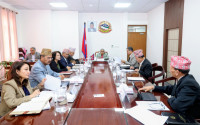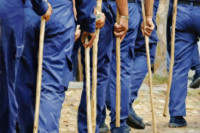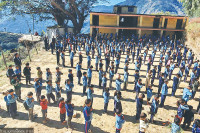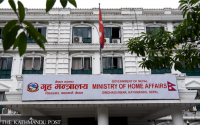National
House panel asks government to let Nepali women take up domestic help jobs in the Gulf
But seven pre-conditions need to be met, members of parliamentary committee say.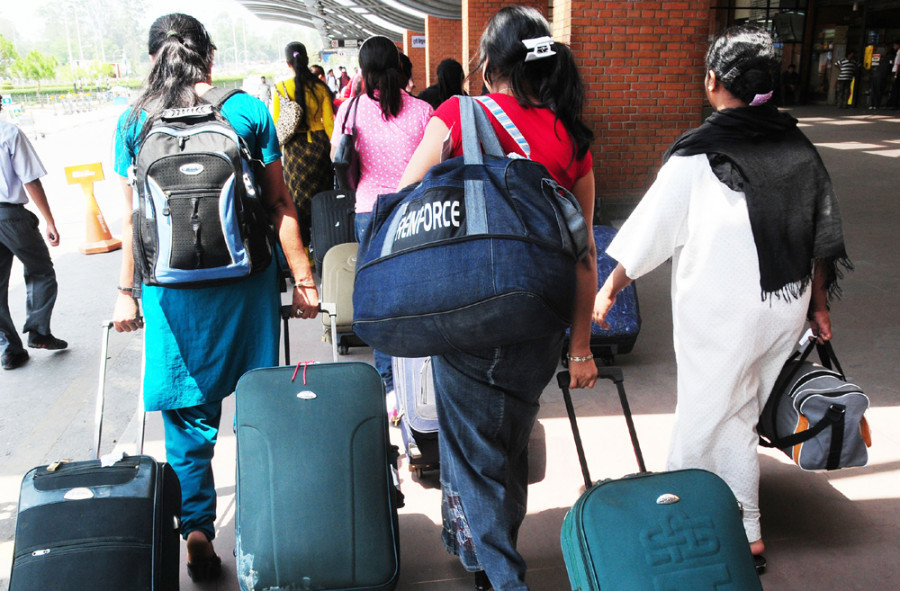
Chandan Kumar Mandal
Nepali women will finally be able to migrate and work in the Persian Gulf as domestic workers.
After more than three years of imposing a ban on Nepali women from taking up domestic jobs in the Gulf countries, a parliamentary committee has now directed the government to allow them to work as domestic help in those countries.
A meeting of the Commerce, Labour and Consumer Welfare Committee on Tuesday asked the government to relax the ban so that women migrants, who often take informal and unsafe routes, will be able to work as domestic help.
According to Bimal Prasad Shreevastav, chairperson of the parliamentary committee, women can travel and work as domestic help even in the Gulf countries as the situation has improved in recent years.
“The existing ban came as the government would not send Nepali women to the Gulf countries as domestic workers without a labour deal with the country of destination,” Shreevastav told the Post. “The Nepal government has signed several labour agreements with many countries. These workers can migrate to work in those countries.”
The government had stopped sending women to the Gulf countries as housemaids after a subcommittee of the then International Relations and Labour Committee of Parliament had ordered the government to bar Nepalis from travelling to the Gulf countries.
The ban was enforced as per the recommendation of the panel, led by Prabhu Sah, which visited the Gulf countries in April 2017 to take stock of the working conditions and other aspects.
The report submitted in August 2017 showed widespread abuse and exploitation of domestic workers, mainly women, in Qatar, Saudi Arabia, the United Arab Emirates and Kuwait, and recommended a ban. Since then, there have been debates around the significance of the blanket ban as job-seeking women have continued to migrate, often through unsafe routes, and are being exposed to more vulnerabilities.
The latest relaxation, however, comes with conditions. The parliamentary committee has enlisted seven conditions for sending Nepali women to work as domestic help in the Gulf region.
The destination countries should have a solid and separate law for ensuring services, conditions and protection. Nepal and labour receiving countries must have a bilateral agreement. Labour agreements should ensure workers’ basic rights like wages, weekly and annual leave, social security, occupational safety and health, working hours, 24-hour insurance, and additional perks for extra work, according to the committee’s directive.
The labour agreements should have envisaged a bilateral, strong and effective mechanism for resolving issues facing domestic workers. Aspiring women workers should have training in domestic help, a basic understanding of the local language and culture, rituals and mandatory training in the host country before starting work.
“When there was no labour agreement between Nepal and countries in the Gulf, Nepali women workers would face difficulties. With the signing of labour agreements, there is the protection of their rights, facilities and also provisions for compensation,” said Shrivastav.
“Women migrating to work as domestic help earlier in the absence of such labour pacts and during ban would be undocumented. They had no rights. Now it is also the responsibility of the host government to protect Nepali workers as mentioned in those pacts.”
Nepal currently has labour agreements with nine countries—Qatar, the United Arab Emirates, Bahrain, Japan, Israel, Jordan, South Korea, Malaysia and Mauritius.
Some of the recent labour pacts such as with Oman and the United Arab Emirates prioritise special arrangements to protect vulnerable groups, especially Nepali female migrants, to protect them from human trafficking, illegal recruitment, and forced labour.
Also, there should be no discrimination in terms of facilities, perks, working environment and safety among Nepali and local workers while engaged in the same kind of work.
The host country should have a law for stringent actions against the local sponsor, host family, employer and any members of the family for any form of physical, mental and sexual violence against Nepali women. Besides, Nepali domestic workers should have easy access to communicate with Nepali missions and their families back home.
Nepali women’s migration has long faced a series of bans over the years, which only affects their right to free movement and seek employment. The protectionist approach of the government has long been criticised for putting women workers in trouble instead as they resort to informal channels and risk falling in the trap of human traffickers.
Labour migration experts welcome the order of the parliamentary committee, but question its immediate implementation and how it will benefit them.
“The parliamentary committee considering women migrants workers issue and relaxing the ban is a praiseworthy effort,” said Sharu Joshi Shrestha, a gender and migration expert. “But has it completely solved the issue? The relaxation of the ban with conditions is still impractical.”
According to Shrestha, meeting the seven conditions prescribed by the parliamentary committee would be difficult.
“Meeting all the conditions would be an ideal situation. The decision says both countries should have agreements to protect women workers. But even when there are no bilateral pacts, domestic workers are also protected by local labour laws,” said Shrestha.




 14.07°C Kathmandu
14.07°C Kathmandu
